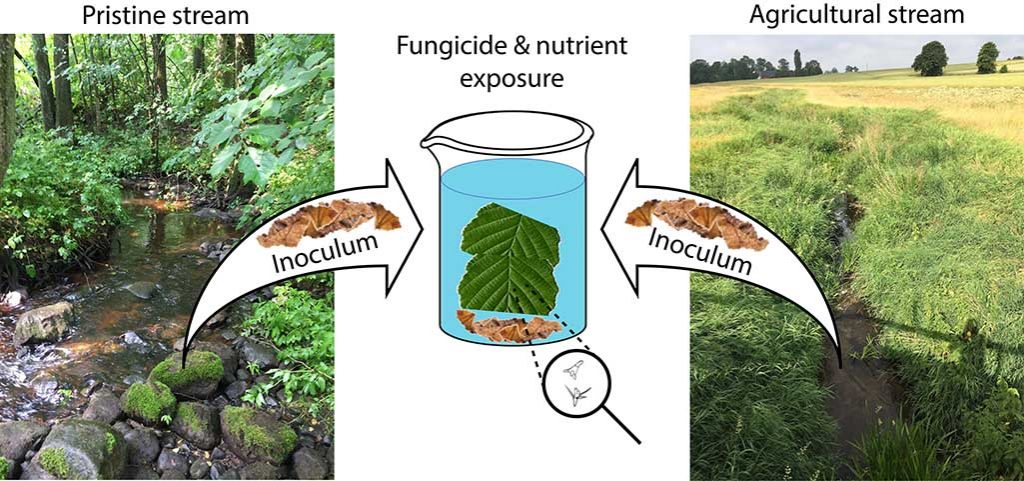In this post, Alexander Feckler talks about their recently published paper “History matters: heterotrophic microbial community structure and function adapt to multiple stressors”.
Agriculture is projected to expand and intensify globally, which in turn will lead to an elevated influx of chemical stressors into adjacent streams. Under this scenario, ecosystem functions such as microbial leaf litter breakdown in aquatic systems may be threatened due to the exposure towards agricultural stressors such as pesticides and nutrients. The subsequent ecological consequences may, however, depend on the exposure history of microbes, with previous exposures towards stressors possibly reducing adverse effects.
To test this hypothesis, we exposed leaf-associated microbial communities with differing exposure histories (pristine vs. agricultural stream) towards fungicides and elevated nutrient levels to assess the effects on their structural and functional stability. Leaf breakdown as well as fungal biomass, diversity, and sporulation were assessed after three weeks of exposure.
Surprisingly, the communities from the agricultural stream showed an elevated leaf breakdown upon fungicide exposure when compared to the fungicide-free control, while – as expected – the communities from the pristine site were negatively affected. Nutrients, on the other hand, induced positive functional effects on both communities, while these effects were stronger for the communities originating from the agricultural stream. The observations for the latter communities are likely explained by the dominance of a few tolerant and effective leaf decomposing fungi that were able to maintain their biomass and sporulation.
Our results demonstrate that microbial communities can structurally and functionally adapt to agricultural stress over the long term. Nevertheless, this adaptational process was accompanied by a reduction in the diversity of the fungal community. This, in turn, might limit the ability of such “thinned out” communities to respond to additional stressors that do not share the mode of action with the stressors the communities already developed a tolerance against (negative species co-tolerances). In addition, the fungal species dominating the microbial community from the agricultural streams are considered less nutritious for leaf-shredding invertebrates, which may reduce the contribution of this group of organisms to leaf breakdown as well. Hence, knock-on effects on higher trophic levels in aquatic food webs might be implied that ultimately jeopardize the integrity of stream ecosystems.
The paper authored by Alexander Feckler, Willem Goedkoop, Marco Konschak, Rebecca Bundschuh, Kilian G. J. Kenngott, Ralf Schulz, Jochen P. Zubrod and Mirco Bundschuh was published in Global Change Biology.

